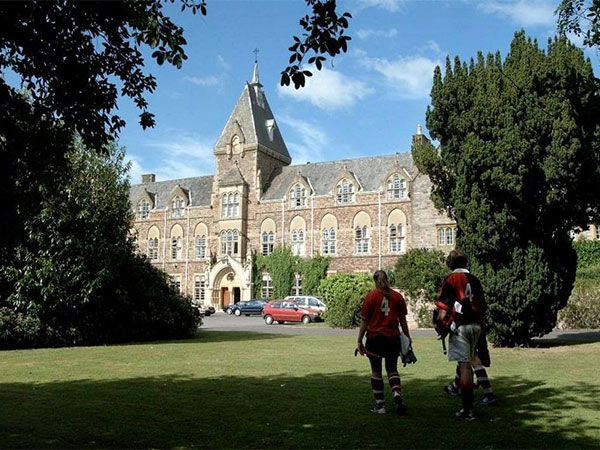
UK: Academicians urge universities to be transparent over donations
Sep 03, 2024
London [UK], September 3: A group of academicians and intellectuals in the United Kingdom have urged universities to be more open about donation sources after a report revealed that a Hong Kong-based donor has been funding a prominent China studies institute run under King's College at London, Nikkei Asia reported.
Reportedly, the non-profit research organization UK-China Transparency, focusing on ties between the countries, in July released a report unearthing that 99.9 per cent of the donations totalling more than 10 million pounds or USD 13.2 million at the King's Lau China Institute at the King's College were donated by Lau Ming-wai, son of Hong Kong tycoon Joseph Lau and chair of property investor Chinese Estates Holdings.
This Hong Kong-listed company was once a major shareholder in Evergrande, a major business entity in China involved in real estate.
King's College, however, has refused to respond to Freedom of Information requests raised by UK-China Transparency seeking information about the donations received by Britain's largest China research centre. Notably, UK law permits anyone to seek information held by public bodies in the country, the Nikkei Asia report claimed.
Academicians from the UK have criticized the decision of King's College, which had been ranked 6th in the UK and 38th in the world by Times Higher Education recently.
Andrew Chubb, a senior lecturer in Chinese politics and international relations at Lancaster University in the UK, said, "King's decision was corrosive as far as trust in the institutional code".
Sam Dunning, the director of UK-China Transparency, expressed his concerns on the matter, stating, "The point is the public should know. It's in the public interest for King's to be transparent about whether there was any influence by the donor over the institute's remit".
Meanwhile, King's College in a statement claimed that its global institutes "operate completely independently from donors, who do not influence the focus of any research undertaken by the institutes," as reported by Nikkei Asia.
Notably, Beijing has been internationally accused of committing human rights abuses against Uyghurs in East Turkistan, a southwestern region of China. Additionally, the US government has also accused the Chinese government of genocide.
One of the factors Dunning mentioned about China's influence on academic work, is the UK's reliance on international students to fund British universities.
According to Nikkei Asia, around 40 per cent of such international students were in deficit this year.
Currently, Chinese students make up the biggest proportion of overseas students in UK universities. A local student pays just a mere 9,250 pounds per year as tuition fees, instead, an international student sometimes pays around 38,000 pounds for education in the country.
"Many of our universities would face going bust in a matter of years without Chinese student fees. That is a systematic incentive for them (universities) not to promote Chinese studies academics who are going to upset Beijing," said Dunning.
Additionally, over 120 academics, politicians, and campaigners had also signed an open letter in April coordinated by media platform openDemocracy, which expressed concerns over opaque university funding in the UK and the influence of major donors, according to Nikkei Asia.
Previously, a study published by openDemocracy found that since 2017, over 281 million pounds have been anonymously donated to top British universities. The University of Oxford accepted 106 million pounds as donations by these anonymous donors.
"There's no requirement to disclose names when challenged. It's an entirely non-transparent situation in the UK," explained John Heathershaw, professor of international relations at the University of Exeter. A group of academicians and intellectuals in the United Kingdom have urged universities to be more open about donation sources after a report revealed that a Hong Kong-based donor has been funding a prominent China studies institute run under King's College at London, Nikkei Asia reported.
Reportedly, the non-profit research organization UK-China Transparency, focusing on ties between the countries, in July released a report unearthing that 99.9 per cent of the donations totalling more than 10 million pounds or USD 13.2 million at the King's Lau China Institute at the King's College were donated by Lau Ming-wai, son of Hong Kong tycoon Joseph Lau and chair of property investor Chinese Estates Holdings.
This Hong Kong-listed company was once a major shareholder in Evergrande, a major business entity in China involved in real estate.
King's College, however, has refused to respond to Freedom of Information requests raised by UK-China Transparency seeking information about the donations received by Britain's largest China research centre. Notably, UK law permits anyone to seek information held by public bodies in the country, the Nikkei Asia report claimed.
Academicians from the UK have criticized the decision of King's College, which had been ranked 6th in the UK and 38th in the world by Times Higher Education recently.
Andrew Chubb, a senior lecturer in Chinese politics and international relations at Lancaster University in the UK, said, "King's decision was corrosive as far as trust in the institutional code".
Sam Dunning, the director of UK-China Transparency, expressed his concerns on the matter, stating, "The point is the public should know. It's in the public interest for King's to be transparent about whether there was any influence by the donor over the institute's remit".
Meanwhile, King's College in a statement claimed that its global institutes "operate completely independently from donors, who do not influence the focus of any research undertaken by the institutes," as reported by Nikkei Asia.
Notably, Beijing has been internationally accused of committing human rights abuses against Uyghurs in East Turkistan, a southwestern region of China. Additionally, the US government has also accused the Chinese government of genocide.
One of the factors Dunning mentioned about China's influence on academic work, is the UK's reliance on international students to fund British universities.
According to Nikkei Asia, around 40 per cent of such international students were in deficit this year.
Currently, Chinese students make up the biggest proportion of overseas students in UK universities. A local student pays just a mere 9,250 pounds per year as tuition fees, instead, an international student sometimes pays around 38,000 pounds for education in the country.
"Many of our universities would face going bust in a matter of years without Chinese student fees. That is a systematic incentive for them (universities) not to promote Chinese studies academics who are going to upset Beijing," said Dunning.
Additionally, over 120 academics, politicians, and campaigners had also signed an open letter in April coordinated by media platform openDemocracy, which expressed concerns over opaque university funding in the UK and the influence of major donors, according to Nikkei Asia.
Previously, a study published by openDemocracy found that since 2017, over 281 million pounds have been anonymously donated to top British universities. The University of Oxford accepted 106 million pounds as donations by these anonymous donors.
"There's no requirement to disclose names when challenged. It's an entirely non-transparent situation in the UK," explained John Heathershaw, professor of international relations at the University of Exeter.
Source: Times of Oman






